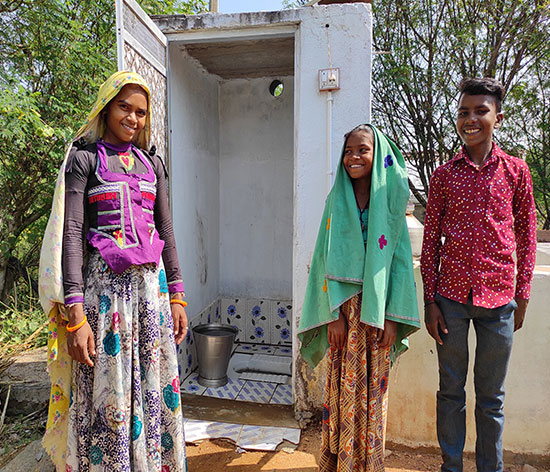WaSH projects in tribal areas of south Rajasthan
The Tata Trusts launched the ‘Transformation Initiative’ (TI) as a multi-thematic social art project under the Tata Water Mission (TWM) with the specific aim of triggering behavioural change and encouraging the adoption of improved WASH habits within target rural communities.
The intent is to bring about change in practices concerning the storage and treatment of water, open defecation and ill-advised practices for personal and menstrual hygiene.
The programme focuses on using latrines with minimum use of water, hand washing with soap (HWWS) before eating and after defecation, water purification/treatment, and appropriate menstrual hygiene management. The TI project, which targets men, women, children, adolescent boys and girls, and school teachers, follows an ABC (Access, Behaviour, Capital) approach in which the ‘Behaviour’ component addresses the root causes of habits that hinder an enabling environment for sustainable access to WASH.
In collaboration with their associate organisation – the Centre for Microfinance & Livelihood (CML) – the Tata Trusts have introduced social art activities such as multi-disciplinary shows (MDS), events, and social and behaviour change communication (SBCC). This is a creative and participatory process that aims at facilitating and encouraging positive change at both individual and collective level, with MDS inspiring people through an informative and entertaining theatrical performance centred around sanitation and other WASH behaviours. These shows spark and inspire people to reflect on their current way of living. They help villagers to easily grasp the consequences of not using toilets.
The programme sparks conversations around WASH. The SBCC campaigns are implemented through groundwork, and thematic performances tailored to target specific WASH behaviours. The specific WASH behaviours that were encouraged include:
- Toilet construction and usage
- Hand washing with soap after defecation, after handling animal or child faeces, and before eating or feeding a child
- Treating water before use (purchase and use of water filter) and proper handling of water (purchase and use of mud tumbler with tap)
The TI programme has shown an immediate impact. The villagers were convinced about avoiding open defecation, and they started constructing toilets. For example, within 10 days of the MDS, the villagers in the hamlet of Dhani in Jodhpur began constructing toilets without any financial support.


